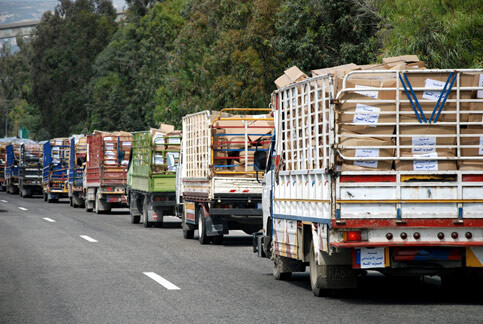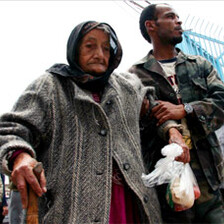Electronic Lebanon 30 May 2007

Aid is delivered to Beddawi Refugee Camp, 26 May 2007. (Tanya Traboulsi)
LEBANON, 30 May 2007 (IRIN) - The heaviest fighting in a week between the Lebanese army and Fatah al-Islam militants in Nahr al-Bared refugee camp in northern Lebanon has raised security concerns for humanitarian workers delivering relief to thousands of Palestinians remaining in the camp.
“We have had access every day for the past few days to deliver humanitarian assistance but we remain very worried about security conditions for the civilians in the camp,” Virginia La Guardian, a spokeswoman for the International Committee of the Red Cross (ICRC) in Beirut told IRIN.
On Tuesday a soldier was killed in a fire-fight, bringing the official death toll to at least 79 - 34 soldiers, 27 militants and 18 civilians — since the army laid siege to the camp on 20 May.
The ICRC on Wednesday delivered a further 30,000 litres of water and 12 tonnes of food into the camp, which has been without electricity or running water since the start of the 11-day battle, the deadliest internal violence since the end of Lebanon’s 1975-1990 Civil War.
The UN Palestinian relief organisation, UNRWA, said there were 31,478 registered refugees in Nahr al-Bared camp, while the Palestinian Popular Committee inside the camp put the figure at around 40,000. The ICRC estimates between 3,000 to 6,000 people remain in the camp.
Sporadic fighting continued through Tuesday night, with no immediate reports of casualties. The Palestine Red Crescent (PRC) had ambulances accessing the camp all day Wednesday.
Beddawi camp
Dr Abdel Aziz of the PRC-run Safad hospital in neighbouring Beddawi camp — which has been flooded with refugees fleeing the violence in Nahr al-Bared — told IRIN the PRC had been unable to implement its plan to set up two temporary clinics inside Nahr al-Bared due to the volatile security situation, leaving the camp without a single functioning clinic.
Beddawi, a cramped two square kilometre camp with an original population of 16,000, has seen an influx of 20,000 people from Nahr al-Bared, according to Dr Yousef Assad of Safad hospital.
Speaking to reporters from the local daily An Nahar on Tuesday, parliamentary leader Saad Hariri played down fears of an imminent ground assault by the army into Nahr al-Bared, a move that would end a decades old agreement whereby Lebanon’s 12 Palestinian camps — home to the majority of the country’s 400,000 refugees — are off limits for the authorities.
“We are not in a hurry. We have to provide proper help to the civilian refugees who fled the camp, and convince the others who stayed in Nahr al-Bared that they should leave,” he said. “And when the army thinks it’s the proper time to act, I will be fully supporting it.”
UN vote on tribunal
Adding to tensions in Lebanon, the UN Security Council was set to vote on the formation of an international tribunal to try suspects in the 2005 assassination of former Premier Rafik Hariri, an issue that has threatened the collapse of the government.
Hezbollah, the militant Shia organisation spearheading a six-month campaign to bring down the Western-backed Sunni-led government of Fouad Siniora, remains implacably opposed to the formation of the tribunal under Chapter VII of the UN’s charter, which would bind Lebanon to the resolution with or without Lebanese consensus.
The lightning rod issue has raised fears of a return to the deadly street riots of January between Shia and Sunni in Beirut.
However, security analysts played down the prospect of immediate street reaction to the Security Council vote.
“Much depends on if the tribunal is passed as a watered down resolution, split between Chapter VI (a non-binding resolution) and Chapter VII,” Timor Goksel, a long time senior adviser to the UN Interim Forces in Lebanon (UNIFIL), told IRIN.
“The current situation in Lebanon could actually divert attention from the tribunal. There will be much vocal reaction, but it is unlikely to find its way to the street at this stage,” Goksel added.
Lebanon charged 19 Lebanese and one Syrian member of Fatah al-Islam with “terrorism” on Wednesday, a charge that carries the death penalty.
This item comes to you via IRIN, a UN humanitarian news and information service, but may not necessarily reflect the views of the United Nations or its agencies. All IRIN material may be reposted or reprinted free-of-charge; refer to the copyright page for conditions of use. IRIN is a project of the UN Office for the Coordination of Humanitarian Affairs.
Related Links


